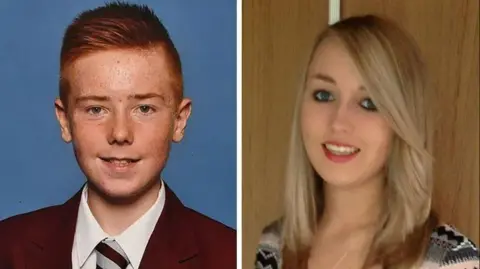Prison service boss says it should lose prosecution immunity
 BBC
BBCThe head of Scotland's jails has told the families of two young people who took their own lives in prison that she believes crown immunity should be abolished.
Teresa Medhurst said the Scottish Prison Service (SPS) should face the possibility of criminal prosecution over deaths in custody.
Ms Medhurst made the comment during a meeting with the families of Katie Allan and William Brown, also known as William Lindsay, who both died by suicide at Polmont Young Offender's Institution in 2018.
Under the law, the Crown, which includes the Scottish Prison Service, cannot be held criminally responsible for deaths in custody.
The Scottish government said it has pursued a change in the law, but that it would require UK government approval.
Last year a fatal accident inquiry (FAI) into the deaths of Katie Allan, 21, and William Brown, 16, made 25 recommendations, which were accepted by the SPS and Scottish government.
The families' lawyer, Aamer Anwar, said the meeting on Wednesday with Ms Medhurst had been "robust and painful".
However, he said it was important Ms Medhurst had agreed crown immunity for the prison service should be "abolished".
In 2022, the Crown Office found a breach of the Health and Safety Act at the jail "materially contributed" to the deaths, but it was unable to act as the SPS was protected by the Crown immunity principle.
Mr Anwar said the families would seek a meeting with prime minister Sir Keir Starmer to further push for a change in the law.
He said: "When you have a situation where the SPS agrees with the lifting of Crown immunity, when the Scottish government and every opposition party in the Scottish Parliament agrees with the lifting of Crown immunity, the question really is now for the UK government to deliver on that.
He added: "The next stage for the families, and for a number of other families we act for, is for a meeting with Keir Starmer and the justice minister, because they carry the power to do this.
"There is clearly unity right across Scotland, from all the institutions as well as the family, to remove Crown immunity. It's unacceptable."
What is Crown immunity?
Crown immunity is a legal principle which states that legislation does not normally apply to the state.
Effectively, it means the state, including government and official bodies, such as the prison service, and sometimes its employees or agents, can be protected from being charged with criminal offences created by statute.
For example, if a person dies while in custody at a jail, the Crown could not be held criminally responsible for their death.
It does not shield them from civil liability, such as the case brought by the family of Allan Marshall, who died after being restrained by up to 17 prison officers at HMP Edinburgh in 2010.
In Scotland, Crown immunity may not always protect prison officers or officials – for example if they are caught using, possessing or giving a "personal communication device," such as a mobile phone, to a prisoner.
A provision of the Health and Safety at Work Act also states, regardless of whether Crown Immunity applies, an individual can be prosecuted if they cause a breach.
Campaigners have long challenged the law, arguing that the public and private sectors do not operate on a level playing field.
'We didn't feel demonised'
Ms Allan's mother, Linda, said the meeting was "very positive," adding it was the "beginning of a dialogue" with the SPS.
She said: "For the first time we didn't feel demonised by the prison service, but we felt listened to, and we found that very restorative."
Speaking after the meeting, Ms Medhurst said: "This was just an opportunity to meet personally with the families, to offer our apologies for their loss, the tragic loss of Katie and William, and to apologise for the failures of the past.
"And to ensure that they understand we are committed and determined to not only action the recommendations that we have accepted in full, but to ensure that there is systemic change across the organisation, which will be impactful and lasting."
The families met the Scottish government's justice secretary, Angela Constance, at Holyrood ahead of a statement to parliament last week.
A spokesperson for the Ministry of Justice said: "The Lord Chancellor has received the letter from the Scottish cabinet secretary for justice and home affairs and will respond in due course."
A Scottish government spokesperson added: "The Scottish government will continue to pursue the lifting of the SPS corporate Crown immunity under reserved health and safety law with the UK government.
"All of the recommendations in his determination of the FAI into the deaths at Polmont YOI of Katie and William have been accepted and the work on these is being delivered at pace with progress closely monitored."
